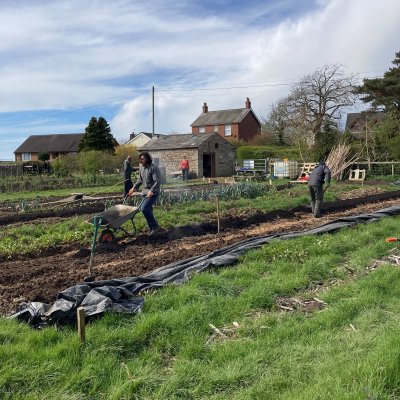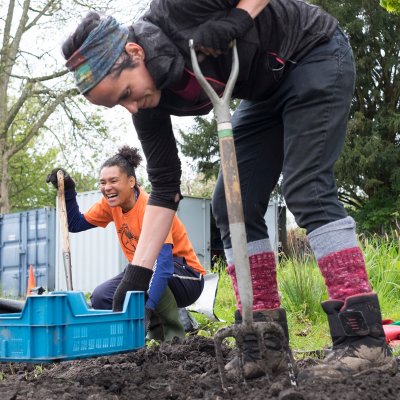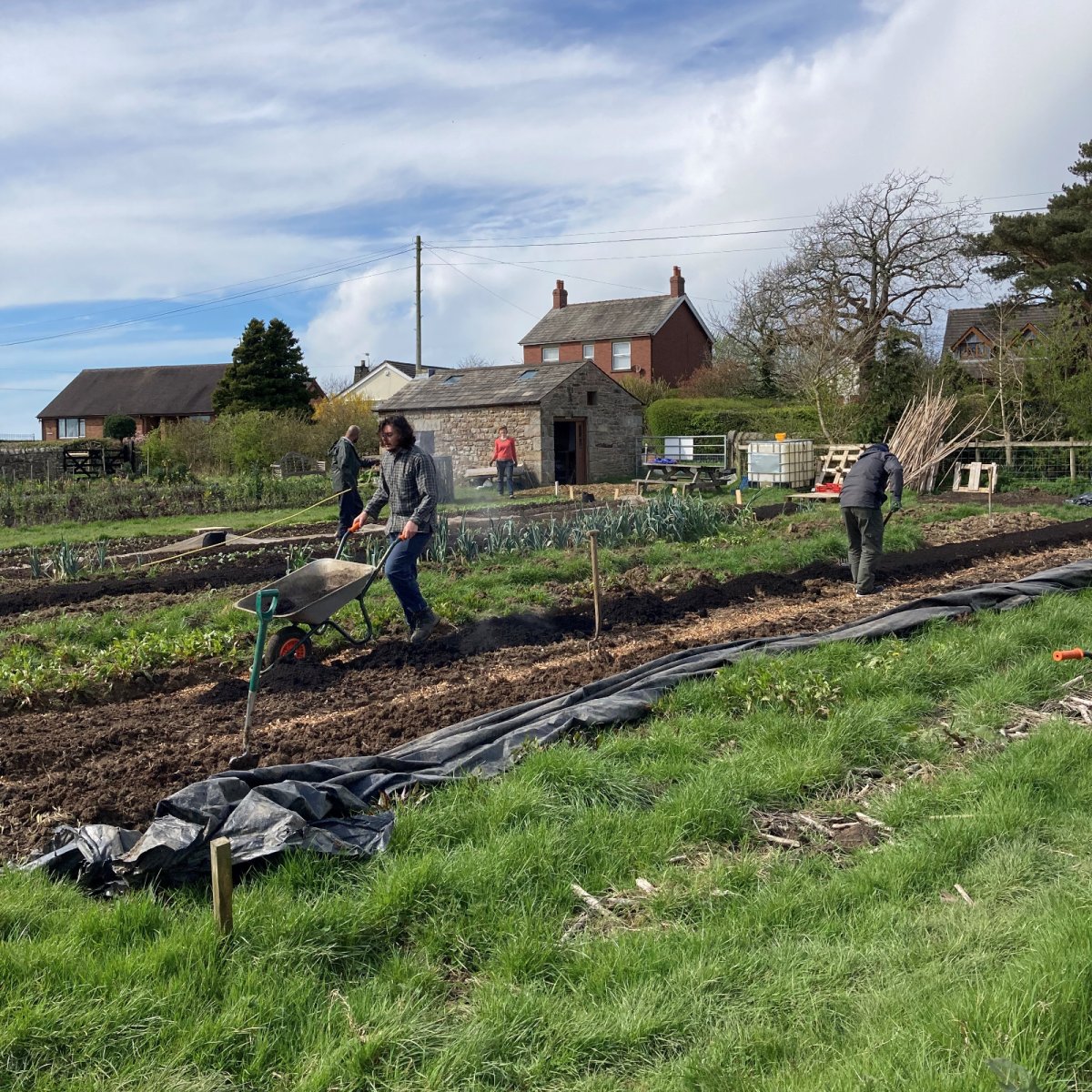 Farmstart at the Plot, LESS, North Lancashire. Credit: Joanna Poulton
Farmstart at the Plot, LESS, North Lancashire. Credit: Joanna Poulton
How can the Landworkers’ Alliance campaign for Farmstarts increase food resilience and equity?
Farmstarts have been championed by Sustain members, the Landworkers’ Alliance, as a promising way for new entrants to secure their careers as farmers. This blog explores the nature and implications of the Farmstart model, as they grow in relevance for agriculture and our Fringe Farming campaign.
Barriers to farming for young people
The agriculture sector has an aging problem that is getting worse. Rather worryingly, Defra & the Government Statistical Service stated that:
In 2016, over a third of all farm holders in England were over the age of 65 years. Just 2% of holders were aged less than 35 years.
This skewed demographic is likely to think and act in a certain way- importantly in terms of responding and adapting to change. But how can we introduce more diversity into the UK farming population?
The barriers to entry are many and often absolute for a new entrant who has not inherited land, infrastructure (including housing), skills and experience, either through family generations or horizontally in their own farming network. Access to land is the first stumbling block. Assuming low available starting capital, land can be impossible to buy and expensive to rent. Even when renting is an option, it does not include the cost of installing the needed infrastructure (e.g. irrigation) that is often missing, as well as the nature of tenancy agreements that can be too short-term and insecure for the long-term investment needed for a farming enterprise.
Even when land is procured, navigating planning permission procedures can be complex, long-winded and ultimately not well designed for the requirements of the farm. This is a critical issue when it comes to having the right to live on the farm site.
One solution would be to obtain a loan to cover the initial high costs. Yet conventional business loans are largely unsuitable because of the high costs and initial low returns associated with starting an agroecological farm. Circumventing this, a new entrant may settle for cheaper equipment and farming systems. This can however have rather obvious detrimental impacts on the long-term viability and efficiencies of their farms.
Finally, new entrants may lack the training, experience, market and networks needed to establish themselves as farmers. New entrants, not brought up with a farming background, will need to somehow find their place in the food system if they are to survive and thrive.
The Government has plans to set up a New Entrants Support Scheme, with bids to be part of its pilot incubator currently underway. It remains to be seen if their approach will work.
Meanwhile, an independent and well developed scheme already exists. The Landworkers’ Alliance champion a Farmstart model for new entrants keen to develop an agroecological farm .
What is a Farmstart?
Farmstarts are diverse in their setup and objectives, depending on the local environment and needs. They are united in providing the key elements of training, land access and markets.
As a training system, Farmstarts can share knowledge, teach skills, allocate mentoring and build up experience and confidence. This is a critical service, given that there very few accredited schemes available and when they are, grants and subsidies to cover training costs are often inaccessible to new entrants.
Furthermore, establishing local markets on one’s own would take time and even then, would not be guaranteed to work. Farmstarts allow new entrants to experiment in farming techniques and choices, build their business plans and nurture their markets, while integrating them in an already established route to market.
Another important feature of a Farmstart is that they can act as a safe haven, or protected environment, in which there is little financial risk involved for new entrants. This allows them to concentrate on farming opportunities rather than the barriers. It also places them in a community of other Farmstarters, which can be empowering and lead to new collaborative opportunities.
Finally, Farmstarts can act as a jumping-off point for establishing an independent farm. The general timeline for new entrants is that before they enter the Farmstart programme, they already have some form of training and on-farm work experience, which have shaped their decision to become farmers. The programme then lasts a few years before graduates go on to initiate long-term business plans and become farmers in their own right.
The growth of the Farmstart scheme
The Landworkers' Alliance's Farmstart handbook outlines the history of Farmstarts. Kindling Trust in Manchester launched the first one in the UK in 2013. This was followed by OrganicLea in London and Tamar Grow Local in the Tamar Valley in the Southwest.
The significance of the Landworkers’ Alliance work on Farmstarts was established in February 2019 after a successful funding bid to the Joseph Rowntree Charitable Trust. This was when it began to grow its network and access to information, and piloted projects, including accredited training and mentoring.
The network has been set up ‘in the spirit of mutual aid and solidarity’ and so knowledge and other resources are shared, and site visits and get-togethers are organised. Workshops are also hosted for organisations that are interested in starting their own Farmstarts.
The Farmstarts that are currently running as part of the network are:
- Kindling Trust in Manchester
- Tamar Grow Local in the Tamar Valley
- OrganicLea in London
- Mach Maethlon in Machynlleth
- LESS in Lancaster
- Barefoot Kitchen in Middlesbrough

What do the successes of the Farmstart scheme mean for local food systems?
Beyond being a handy guide for how to start a Farmstart - including how to fund and run a Farmstart, what kind of training to offer and how to encourage community engagement – the Landworkers' Alliance Farmstart handbook and network should have important implications for building local agroecological food systems, the primary objective of Sustain’s Fringe Farming campaign. Defra's up-coming New Entrant Support Scheme could use Farmstarts as a model, and perhaps even offer support given that they share a lot of common goals.
Farmstarts represent an important tool for farming by tackling how to attract new entrants, particularly from under-represented demographics, in a sector that is overwhelmingly old, white, male and straight (though this is slowly changing).
This should be taken seriously whether we want to transform agriculture from within or establish alternative food systems. Those currently well represented and in positions of power may be less open to change, especially radical change. This could be a cause for concern in the face of critical issues that we are faced with today like rapid species extinction, climate change and the rising cost of living.
By growing the network and critical mass of agroecological food growers, and so enhancing shorter supply chains, there will be greater potential for innovative and more environmentally and socially conscious alternative food systems. This includes access to affordable, healthy food, reducing our over-reliance on global food trade and protecting the planet, including cutting carbon emissions and soil protection.
Farmstarts allow new entrants to overcome initial barriers – e.g. lack of access to land, capital and training – to becoming farmers and so aligns with the UK government’s commitment to Levelling Up. This can mean more resilient livelihoods, enterprise and entrepreneurship, and decent incomes for young people in farming. At a societal level, making farming a more attractive economic activity, even at smaller scales, can be highly productive and part of wider demands for food sovereignty, land justice, reclaiming the commons and empowering local communities.
Fringe Farming: The Fringe Farming project is a collaboration with partners across the UK to understand barriers, identify land opportunities and local actions, and develop national policy to enable agroecological farming at the edge of cities as part of a green economic recovery.
Sustain
The Green House
244-254 Cambridge Heath Road
London E2 9DA
020 3559 6777
sustain@sustainweb.org
Sustain advocates food and agriculture policies and practices that enhance the health and welfare of people and animals, improve the working and living environment, promote equity and enrich society and culture.
© Sustain 2024
Registered charity (no. 1018643)
Data privacy & cookies








